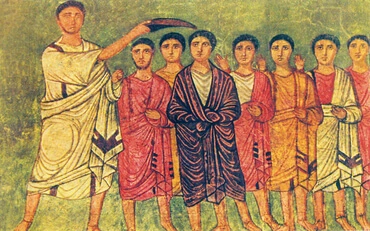1
A ovo je pleme Aronovo i Mojsijevo, kad Gospod govori s Mojsijem na gori Sinajskoj.
2
I ovo su imena sinova Aronovih: prvenac Nadav, pa Avijud i Eleazar i Itamar.
3
To su imena sinova Aronovih, sveštenika, koji biše pomazani i posvećeni da vrše službu svešteničku.
4
Ali pogibe Nadav i Avijud pred Gospodom, kad prinesoše oganj tuđ pred Gospodom u pustinji Sinajskoj; i ne imaše dece; zato Eleazar i Itamar otpravljahu službu svešteničku za života Arona, oca svog.
5
A Gospod reče Mojsiju govoreći:
6
Kaži neka pristupi pleme Levijevo, i postavi ga pred Aronom sveštenikom da mu služe,
7
I da rade za nj i za sav zbor pred šatorom od sastanka služeći šatoru,
8
I da čuvaju sve posuđe u šatoru od sastanka, i da straže za sinove Izrailjeve služeći šatoru.
9
Pa ćeš dati Levite Aronu i sinovima njegovim; oni su darovani njemu između sinova Izrailjevih.
10
A Arona i sinove njegove postavi da vrše svešteničku službu svoju; ako li bi ko drugi pristupio, da se pogubi.
11
Još reče Gospod Mojsiju govoreći:
12
Evo uzeh Levite između sinova Izrailjevih za sve prvence što otvaraju matericu među sinovima Izrailjevim; zato će moji biti Leviti.
13
Jer je moj svaki prvenac; od onog dana kada pobih sve prvence u zemlji misirskoj, posvetih sebi svakog prvenca u Izrailju od čoveka do živinčeta; moji će biti; ja sam Gospod.
14
Još reče Gospod Mojsiju u pustinji Sinajskoj govoreći:
15
Izbroj sinove Levijeve po domovima otaca njihovih, po porodicama njihovim, sve muškinje od meseca dana i više izbroj.
16
I Mojsije ih izbroja po zapovesti Gospodnjoj, kako mu bi zapoveđeno.
17
I behu sinovi Levijevi po imenu ovi: Girson i Kat i Merarije.
18
A ovo su imena sinova Girsonovih po porodicama njihovim: Lovenije i Semej.
19
A sinovi Katovi po porodicama svojim: Amram i Isar, Hevron i Ozilo.
20
A sinovi Merarijevi po porodicama svojim: Malije i Musije. To su porodice levitske po domovima otaca svojih.
21
Od Girsona porodica Lovenijeva i porodica Semejeva. To su porodice Girsonove.
22
A izbrojanih među njima, kad se izbroja sve muškinje od meseca dana i više, beše ih izbrojanih svega sedam hiljada i pet stotina.
23
Porodice Girsonove stajahu u logor iza šatora sa zapada.
24
A starešina od doma otačkog u porodicama Girsonovim beše Elisaf, sin Dailov.
25
A sinovi Girsonovi čuvahu u šatoru od sastanka šator i naslon, pokrivač njegov i zaves na vratima šatora od sastanka,
26
I zavese od trema i zaves na vratima od trema što je oko šatora i oko oltara, i uža njegova za svaku potrebu njegovu.
27
A od Kata beše porodica Amramova i porodica Isarova i porodica Hevronova i porodica Ozilova. To su porodice Katove.
28
Svega muškinja od meseca dana i više beše na broj osam hiljada i šest stotina, koji služahu oko svetinje.
29
Porodice sinova Katovih stajahu u logor pored šatora s juga.
30
A starešina od doma otačkog u porodicama Katovim beše Elisafan, sin Ozilov.
31
A oni čuvahu kovčeg i sto i svećnjak i oltar i posuđe u svetinji kojim služe, i zaves, i sve što pripada k njemu.
32
A starešina nad starešinama levitskim beše Eleazar, sin Arona sveštenika, postavljen nad onima koji čuvaju svetinju.
33
A od Merarija beše porodica Malijeva i porodica Musijeva. To su porodice Merarijeve.
34
I beše ih izbrojanih, kad se izbroja sve muškinje od meseca dana i više, šest hiljada i dvesta.
35
A starešina od doma otačkog u porodicama Merarijevim beše Surilo sin Avihejev; oni stajahu u logor pored šatora sa severa.
36
I sinovi Merarijevi čuvahu daske od šatora i prevornice njegove i stupce njegove i stopice njegove i sve sprave njegove i sve što k njemu pripada,
37
I stupce od trema unaokolo i stopice njihove i kolje i uža njihova.
38
A pred šatorom od sastanka s istoka stajahu u logor Mojsije i Aron i sinovi njegovi čuvajući svetinju za sinove Izrailjeve; a da ko drugi pristupi, poginuo bi.
39
A svega Levita kad ih izbroja Mojsije i Aron po zapovesti Gospodnjoj po porodicama njihovim, svega muškinja od mesec dana i više, beše dvadeset i dve hiljade.
40
I Gospod reče Mojsiju: Izbroj sve prvence muške među sinovima Izrailjevim od meseca dana i više, i saberi broj imena njihovih.
41
I uzmi Levite za mene (ja sam Gospod) mesto svih prvenaca među sinovima Izrailjevim, i stoku levitsku mesto svih prvenaca od stoke sinova Izrailjevih.
42
I izbroja Mojsije kako mu zapovedi Gospod, sve prvence među sinovima Izrailjevim;
43
I svega prvenaca muških, kad se izbrojaše po imenima od jednog meseca i više, beše izbrojanih dvadeset i dve hiljade i dvesta i sedamdeset i tri.
44
I Gospod reče Mojsiju govoreći:
45
Uzmi Levite mesto svih prvenaca među sinovima Izrailjevim i stoku levitsku mesto stoke njihove, da budu moji Leviti; ja sam Gospod.
46
A da se otkupe oni dvesta i sedamdeset i tri, što ima prvenaca među sinovima Izrailjevim više nego Levita,
47
Uzmi po pet sikala od glave; uzmi po svetom siklu (a u taj sikal ide dvadeset gera).
48
I podaj te novce Aronu i sinovima njegovim, otkup za one koji prelaze broj njihov.
49
I uze Mojsije otkup od onih koji ostaše preko onih koji biše promenjeni za Levite.
50
I uze novce od prvenaca sinova Izrailjevih, hiljadu i trista i šezdeset i pet sikala, po svetom siklu.
51
I dade Mojsije taj otkup Aronu i sinovima njegovim po zapovesti Gospodnjoj, kao što zapovedi Gospod Mojsiju.







